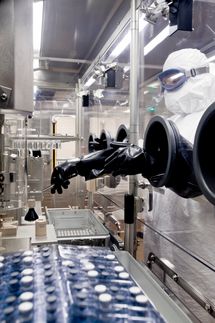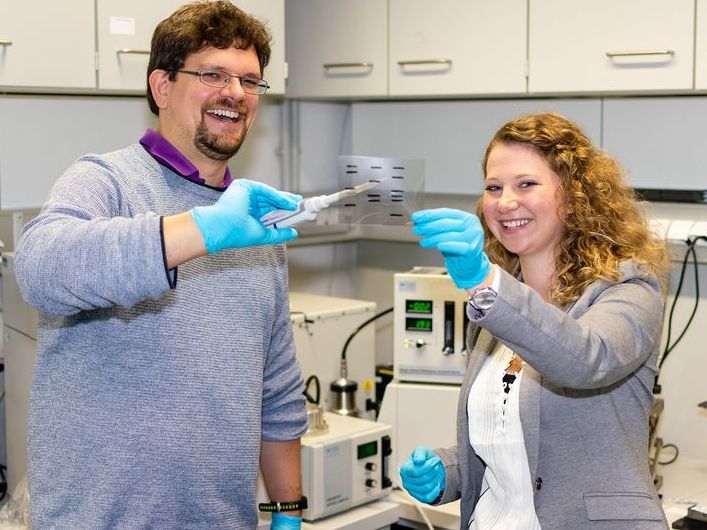Interface between syringe and device
Gerresheimer develops an interface for the integration of glass syringes in autoinjectors
The development of autoinjectors generally involves the integration of a pre-filled glass syringe into a plastic drug delivery device – a major challenge due to the different tolerances of both materials. Gerresheimer has now filed a patent application for its Gx G-Fix standard adapter for precise and reliable positioning of syringes and needle shields.
Drug delivery devices play an increasingly important role in the market for pharmaceutical products. A rising number of patients suffering from chronic diseases such as rheumatism, arthritis or Parkinson inject their drug themselves with the help of autoinjectors. Self-administering drugs in this way obviates the need for regular visits to the doctor, is more comfortable, and relieves the health care sector. Most autoinjectors contain two main modules: the injector itself and the prefilled syringe. Both modules are combined in one assembly, which is specified by the pharmaceutical company and supplied to the market in one piece. This approach is important as medical technology products are subject to high quality standards and must be reliable. In practice, however, the production of autoinjectors has to deal with the tolerance requirements of two entirely different materials: the device is made of plastic while the prefilled syringe is made of glass.
Gerresheimer, a leading international partner of the pharmaceutical and healthcare industry developed a solution that allows an easy integration of syringes in drug delivery devices and has now applied for a patent. “Gerresheimer’s Plastics & Devices Division is the expert for glass and polymer products, “ Andreas Schütte, Member of the Board of Gerresheimer and Head of the company’s Plastics & Devices Division explains. “When we developed Gx G-Fix, we pooled our comprehensive intelligence in the area of prefilled glass syringes and polymer-based drug delivery devices and created an interface that works without complex two-component injection molded parts or sophisticated assembly processes.“ Attached to the syringe shoulder, the plastic standard adapter provides a precisely defined interface to the device.
In the autoinjector, Gx G-Fix has several functions. First, the adapter connects the syringe with the device. Before, the high dimensional tolerance of the glass syringe allows only marginal control of the injection needle’s position in the front opening of the autoinjector. As Gx G-Fix is specifically adapted to the autoinjector, it allows accurate needle positioning and significantly higher control of the injection process.
Second, the syringe is well protected from breaking. Conventional products coupled the syringe with the finger flange. When triggered, the structurally sensitive flange is subjected to a lot of pressure and can easily break. With Gx G-Fix, however, attaching the syringe at the sturdier shoulder has minimized the risk of breakage substantially. Moreover, Gx G-Fix allows a precisely defined distance to the rigid needle shield (RNS). As most autoinjectors are equipped with long 1ml syringes, tolerances often result in a repositioning of the RNS either towards the front or towards the rear, which means that RNS removal requires autoinjector caps with a complex design. This problem can be solved by using a variation of the adapter that connects with the RNS. With a clearly defined position, RNS removal no longer requires a specific design of the injector cap.
The Gx G-Fix is assembled as part of the ready-to-fill syringe processing at the syringe manufacturer’s facility. Device integration and RNS positioning with Gx G-Fix can be used individually or in combination. Plastic syringes can also be easily fitted with the adapter. Autoinjectors with Gx G-Fix are therefore suitable for plastic and glass syringes and can therefore be used for a variety of drugs. This does not require any changes to the customer’s filling station.
Most read news
Organizations
Other news from the department business & finance

Get the life science industry in your inbox
By submitting this form you agree that LUMITOS AG will send you the newsletter(s) selected above by email. Your data will not be passed on to third parties. Your data will be stored and processed in accordance with our data protection regulations. LUMITOS may contact you by email for the purpose of advertising or market and opinion surveys. You can revoke your consent at any time without giving reasons to LUMITOS AG, Ernst-Augustin-Str. 2, 12489 Berlin, Germany or by e-mail at revoke@lumitos.com with effect for the future. In addition, each email contains a link to unsubscribe from the corresponding newsletter.





















































